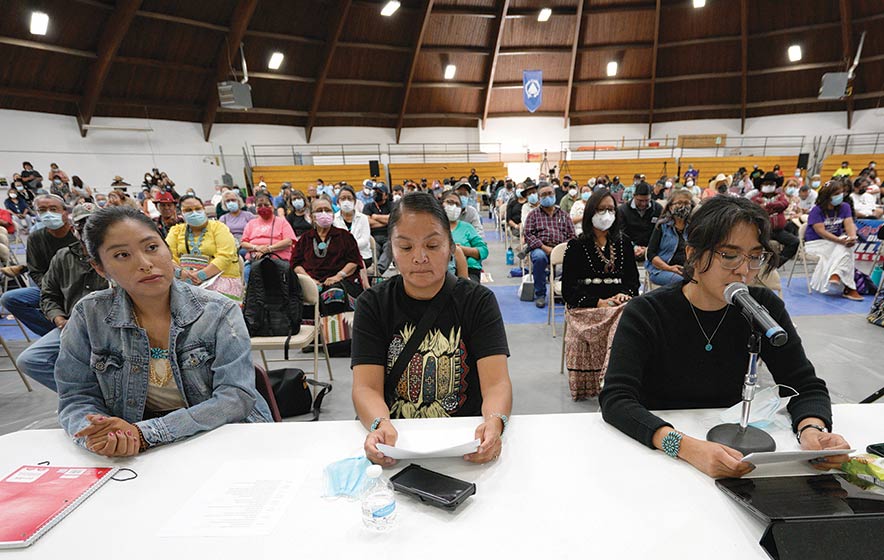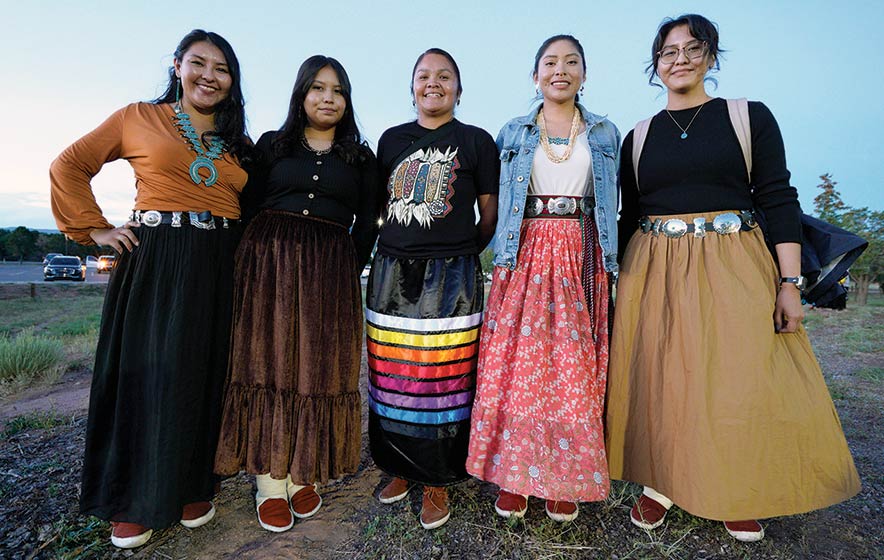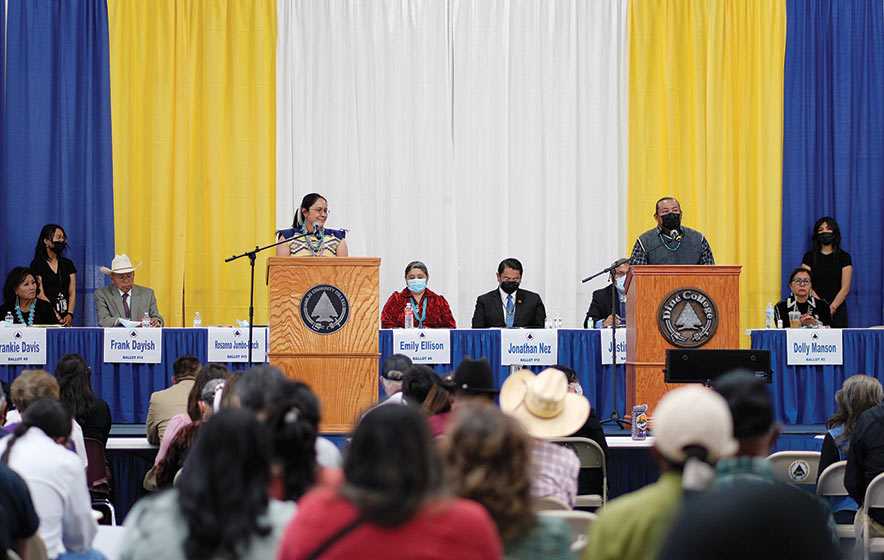
Key issues at Diné College: Youth want homes, jobs

Navajo Times | Donovan Quintero
Student panelists, from left, Najhozhoni Rain Ben, Rachel Brown and Harley Interpreter ask the candidates for president questions on Tuesday at Diné College in Tsaile, Ariz.
TSAILE, Ariz.
Navajo youth want to come home.
But there are no good-paying jobs to which they can return.
For student panelists, who posed several questions to the candidates for Navajo president on Tuesday evening during a forum at Diné College, lack of jobs on the Nation is important.
Najhozhoni Rain Ben, a senior at the University of New Mexico majoring in Economics, asked candidates Emily Ellison and Dolly Manson how they would guarantee youth to come home to good-paying jobs.
Ben is Yé’ii Dine’é, born for Oozéí Táchii’nii. Her maternal grandfathers are Kinłichíi’nii and her paternal grandfathers are Áshįįhí. She is from Naataanii Nééz.
“I want to come back, we want to come back to our homeland,” she added.
“We tell them, ‘Go to school, learn bilagáana way, and then come back,’ and then we discriminate against them,” Ellison said in English.
Ellison mentioned decorated Marine Corps veteran Chris Deschene, a non-Navajo speaking Diné who ran for tribe’s highest office.
“We put them down when they don’t speak our language – that’s the first barrier,” Ellison said.
Deschene was disqualified for not being fluent in Navajo in 2014.
Justin Jones, a Marine Corps veteran and current candidate for president, had represented Dale Tsosie and Hank Whitethorne who challenged Deschene’s candidacy, saying he lied about being a fluent Navajo speaker.
Nearly eight years later, Ellison said it was time to start talking about including non-Navajo speaking youth without criticizing them for it.
Ellison asked how the tribe can fix its economy, let alone create jobs for youth.
“(The) first thing to have an economy is private land,” Ellison said. “All of your land is leased and held in trust. We’re basically a communist nation.
“You can take a lease, have it for 68 years, pay no taxes, there’s no growth,” she said. “Where’s the motivation?
“Why would someone want to build a house for $200,000 on a home-site lease that they don’t own,” she asked, “that they can’t transfer to their offspring?”
The panel

Navajo Times | Donovan Quintero
Student panelists for the candidates for president forum include, from left, Marquel Begay, Torri Small, Rachel Brown, Najhozhoni Rain Ben and Harley Interpreter. The forum was on Tuesday at Diné College in Tsaile, Ariz.
The panel included Marquel Begay, a third-year Ph.D. student majoring in ecology, management and rangeland restoration, at the University of Arizona.
And Torri Small, a senior at Many Farms High who is a dual-credit student at Diné College.
Also Harley Interpreter, a senior at Diné College majoring in psychology. And Patrick Blackwater, an assistant professor at Diné College with the School of Business and Social Science who is a second-year justice studies student in the School of Social Transformation at Arizona State University.
And Rachel Brown, a graduate student at Fort Lewis College.
Ben said, “From my personal experience, there’s not a lot of economic jobs here on the Navajo Nation.”
She said youth, even highly educated youth, did not have many employment opportunities. To create an income for herself on the reservation, Ben said she turned to ranching and farming.
Begay said she has moved home. A first-generation college student, she said she started pursuing higher education so she could start her own business knowing the odds are stacked against her.
“We already know there’s a lack of jobs here,” she said. “It’s really up to us youth to make that change. We can’t just depend on the Navajo Nation government to create jobs for us. We have to do ourselves, us, the youth have to do it.”
Begay plans a consulting business to help farmers and ranchers using her expert background, and to give them a voice and provide them with an actionable plan and help them improve the landscape.
“When we talk about economy, we’re still going in circles,” Ellison said. “We’re not going to change until we own that land,” said Ellison.
Get an education

Navajo Times | Donovan Quintero
Candidates for president Rosanna Jumbo-Fitch, left, and Kevin Cody, stand at the podium during the candidate’s forum on Tuesday in Tsaile, Ariz.
Dolly Manson said parents tell their children to come home after they get an education.
“That’s what I was told,” said Manson in Navajo. “My parents never went to school. They don’t know the English language.
She said her parents told her, “‘I don’t know what you want to go to school for but go and get your education because we are told everything is in the bilagáana way now. And when you’re done, you can come home and make life better here for us.’”
Manson said she listened to her parents and left the reservation to get an education.
“I went to high school in Massachusetts,” she said, “and then I went to the University of New Mexico and New Mexico State and spent a number of years on the reservation as I pursued my education.”
She returned expecting to build herself a home only to run into the home-site lease conundrum and how long it takes.
“When I’m president,” Manson said, “I would simplify and decrease the home-site lease application process.
“Right now, there are 140,000 Navajos living on the reservation,” she said. “We have many more youth living off the reservation, who want to come home.”
She said if the tribe wants them to come home, opportunities must be created for them, not just stable employment but also home-site leases on which they can build.
“We also need to create entrepreneurial opportunities for them,” said added. “We need to set aside land for them to build their businesses on.”
Roe v. Wade
On the recent overturning of Roe v. Wade by the U.S. Supreme Court, Harley Interpreter said the overturn fundamentally uprooted all the processes that have been in place and upheld since 1973.
While the majority group of conservative justices, who stated the case needed to be overruled because it was “egregiously wrong,” the minority group of liberal justices stated the overturn meant women no longer would have a personal choice and would force them to “bring a pregnancy to term.”
Interpreter said the ruling made it more dangerous for women who opted for an abortion.
The Diné College psychology major added that educational institutions could reintroduce human sexuality courses into curriculums.
“So that way, both our Navajo – incoming and then maybe returning students – have a better understanding of themselves as a growing person and all of their needs as well,” said Interpreter.
Candidate Ethel Branch said after the forum the Supreme Court decision was “tremendously sad.”
“This decision will reverberate more strongly for our women on Dinetah,” said Branch, who was the Navajo Nation attorney general under Russell Begaye’s administration.
Branch said Navajo women who are raped or victims of incest would be at risk of having to carry their rapist or family member’s children to term.
“We need to wield our sovereignty to ensure our women are protected from this threat on Dinetah through our own Navajo Nation abortion laws,” she said.
Panelist Rachel Brown said it was a personal issue for her. An ovarian cancer survivor, Brown said a man telling a woman what to do with her body was worrisome.
“I couldn’t go to someone and say, ‘Well, you can’t do this because, this and this,’” she said. “It makes you mad, it wants you to go over to Washington, tell them, ‘What if we tell you not to do these things with your body? What if we have you get a vasectomy? How would you feel about that?’.
She added ovarian cancer took away a chance for her to have her own family.
“I don’t have my organs anymore,” she said. “So, hearing that my fellow sisters don’t have that right and they have to go through different things, it’s not right. It hits you in the heart.”







 Highway 264,
Highway 264, I-40, WB @ Winslow
I-40, WB @ Winslow